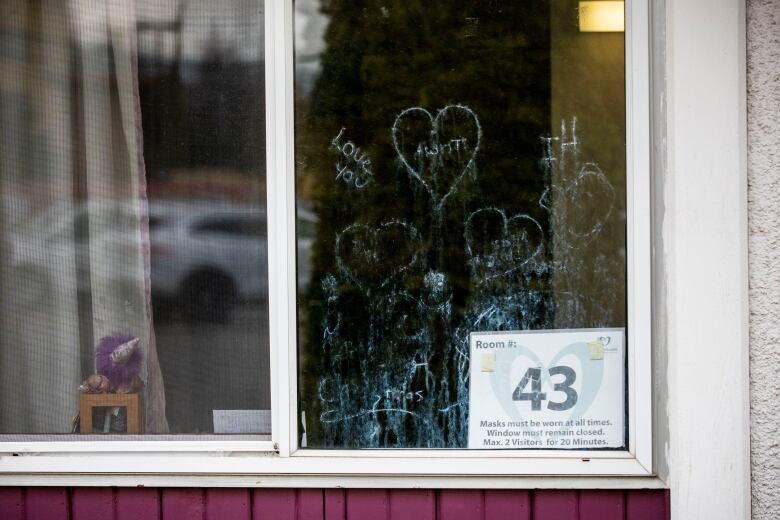Essential visitor rules at B.C.'s long-term care facilities spark confusion, concern from families
Some B.C. families say restrictions on visiting loved ones in long-term care remain too strict

Some families in B.C. say current restrictions on visiting their loved ones in long-term care facilities remain too strict and worry the province is failing to ensure quality of life forseniors.
For the past month, Danielle Nolhas been the only visitor allowed to see her 88-year-old mother who lives in a care home in Maple Ridge, B.C. Her mother, who lives with dementia, has faced deteriorating mental health recently, she said.
"My sons are not able to visit her," she told CBC News. "My older son in particular had a very close relationship with her when she was living with us, so he misses her."
While there have been COVID exposures at her mother's care home and on the same unit, she said her mom has never tested positive for the virus.
On Jan. 1, the province reinstated a restriction that bars all but "essential visitors" fromlong-term care facilities.
According to provincial government guidance on the issue, updated Jan. 21, the new health orders are essential to "protecting long-term care residents" from the more contagious Omicron variant.
"Essential visits include visits for compassionate reasons, such as end-of-life care or those essential to a resident's care and mental well-being," says the province's website on long-term care guidance.
The province asks would-be visitors to contact each individual long-term care facility to find out if they qualify as "essential," and anyone approved must be double-vaccinated and wear a mask except when in their resident's private room.
But some families say leaving the decision on who is "essential" to operators has created uncertainty, confusion and concern for the well-being of their loved ones.

This week, Provincial Health Officer Dr. Bonnie Henry said about 40 per cent of deaths in January were related to outbreaks in long-term care.
While that's a significant number, B.C.'s seniors' advocate Isobel Mackenzie says it's important to highlight how far we've come.
"Before the vaccine, the percentage of residents who died of COVID after contracting it was 30 per cent," she told CBC News. "Now what we're seeing with the vaccines and this particular variant, we're seeing four per cent."
ButOmicron can still be deadly for those most at risk.
"In long-term care, we still need to keep infectious people away ... that's where the rapid tests are really good," she said. "Families really need to connect with their loved ones.
"We should be directing our tools, our rapid tests, more aggressively to long-term care."
Terry Lake, CEO of the B.C. Care Providers Association, says more priority must be given to the benefits of having loved ones visit those in long-term care.
Lake, the province's former health minister, said care homes have not been able to accommodate as many visitors as they couldbecause of a shortage of rapid-test supply. Lake said that's starting to improve, but it's prevented many seniors from safely having visitors.
This week, B.C. marked two years since the first COVID case was identified in theprovince.The provincial health officer says seniors and people who are unvaccinated remain most at risk of contracting the virus.
But while the province has hinted that an update and possible easing of some COVID health and safety restrictions are expected in mid-February, it remains unclear if rules at long-term care facilities like Nol 's mother's will change.
"Particularly in long-term care and end of life care, you don't know how many more visits you have," Nol said."Yes, they may still be alive, but what is their quality of life?"
LISTEN:B.C.'s seniors' advocatediscusses COVID and long-term care
With files from Isabelle Raghem












_(720p).jpg)


 OFFICIAL HD MUSIC VIDEO.jpg)
.jpg)



























































































